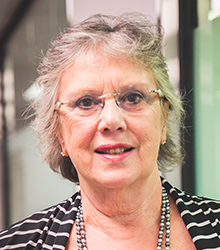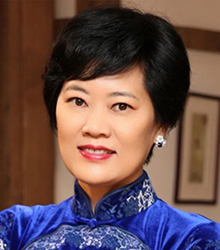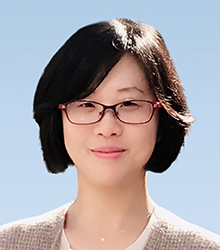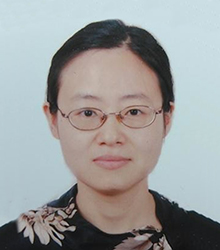Symposiums--SIGCSE China
organizers
General Co-Chairs:
Ming Zhang (Peking University, China)
TPC Co-Chairs:
Juan Chen (National University of Defense Technology, China)
Yu Zhang (University of Science and Technology of China, China)
Meeting schedule
| Date(2021-07-30)Location(Zoom meeting) Click the link to enter the zoom meeting:https://tiktok.zoom.com.cn/wc/join/98164407315 |
||||
| Time | Talks | Moderator | Speaker | |
| 19:40-20:10 | Keynote 1 | Contemporary Education Concepts: International Computing Benchmarking | Ming Zhang | Alison Clear, Associate Professor, Eastern Institute of Technology, Auckland, New Zealand, Co-Chair of the ACM/IEEE CC2020 |
| 20:10-20:30 | Q & A session | |||
| 20:30-21:00 | Keynote 2 | High-Performance Computing and Competency-Based Education | Juan Chen | John Impagliazzo, Professor Emeritus, Hofstra University, IEEE Fellow and Life Member, ACM Distinguished Educator |
| 21:00-21:20 | Q & A session | |||
| Date(2021-07-31)Location(Meeting Room No.3) | ||||
| Time | Talks | Moderator | Speaker | |
| 14:00-14:30 | Keynote 3 | Competency Model in ACM/IEEE CC2020 Computing Curriculum | Yu Zhang | Ming Zhang, Peking University, China |
| 14:30-15:00 | Keynote 4 | Competency-based HPC Education Practices | Yu Zhang | Juan Chen, National University of Defense Technology, China |
| 15:00 -15:40 | Panel | ACM/IEEE CC2020 | Zichen Xu | Ming Zhang, Juan Chen, Xiaochun Yang, Xi Wu, Ye Tian |
| 15:40-15:50 | Coffee Break | |||
| 15:50-16:10 | paper | Quality-Driven and Abstraction-Oriented Software Construction Course Design: To Fill the Gap between Programming and Software Engineering Courses | Zichen Xu | Zhongjie Wang, Harbin Institute of Technology, China |
| 16:10-16:30 | paper | Online Judge for FPGA-based Lab Projects in Computer Organization Course | Zichen Xu | Yuxiang Zhang, Tsinghua University, China |
| 16:30-17:30 | SIGCSE China Council Meeting | Ming Zhang | ||
| Date(2021-08-01)Location(vip room) | ||||
| Time | Talks | Moderator | Speaker | |
| 14:00-14:30 | Keynote 3 | Enlightenment of Computer Education in Current U.S. High Schools to Corresponding Education in China | Juan Chen | Xiaochun Yang, Shanghai AchieveFun Info Tech Co., Ltd. China |
| 14:30-14:50 | paper | A MOOC Courses Recommendation System Based on Learning Behaviours | Junlin Lu | Shengjun Yin, Harbin Institute of Technology, China |
| 14:50-15:10 | paper | How do early programmers benefit from SPOC blended teaching: a data-driven analysis | Junlin Lu | Qing Sun, Beihang University, China |
| 15:10-15:30 | paper | Web Security Education in A Multidisciplinary Learning Context | Junlin Lu | Liu Qiang, National University of Defense Technology, China |
| 15:30-15:40 | Coffee Break | |||
| 15:40-16:00 | paper | KT-XL: A Knowledge Tracing Model for Predicting Learning Performance Based on Transformer-XL | Xiaochun Yang | Yu He, University of Science and Technology of China |
| 16:00-16:20 | paper | Developing (Almost) Free Distributed System Labs Using Container-based Technique | Xiaochun Yang | Zichen Xu, Nanchang University |
| 16:20-16:40 | paper | Recognition Of Learners' Personality Traits For Software Engineering Education | Xiaochun Yang | Yidi Du, Northeastern University |
| 16:40-17:00 | paper | Designing a Course of Programming Language Foundations that Closely Combines Practice | Xiaochun Yang | Yu Zhang, University of Science and Technology of China |
| 17:00-17:20 | paper | A Competence-Based Three-Layer Cybersecurity Education Framework and Its Application | Xiaochun Yang | Qiang Liu, National University of Defense Technology,China |

Keynote:Contemporary Education Concepts: International Computing Benchmarking

Alison Clear
Associate Professor, Eastern Institute of Technology, Auckland, New Zealand
Co-Chair of the ACM/IEEE CC2020
Abstract: In March 2021 the ACM/IEEE-CS Computing Curricula 2020 (CC2020) report was published. This report covers all the areas of computing and is global in its attention. The report looks at and analyses the six discipline areas of computing that currently have ACM and IEEE-CS approved curricula: Computer Engineering, Computer Science, Software Engineering, Information Systems, Information Technology and Cyber Security. Note, the report does not yet include Data Science as that new curriculum was still under development. The report adopted “competency” as the modern cotemporary education concept which will become the foundation for future curriculum guideline reports. It also designed interactive computing tools for all stakeholders to visually represent computing competency as well as knowledge and skill. A clear difference exists between the computing disciplines and that they all have distinguishing characteristics that are essential for their individual identities. Traditionally these areas had their own degrees and were taught in universities globally, however many educational institutions have worked with industry and developed more cross discipline degree programs to meet the needs of the industry and also those of the newly graduated computing professionals. The CC2020 Steering Committee analysed all the approved curricula in the six discipline areas and looked for any overlaps. For example all the disciplines have some aspect of programming but not all at the same level. A Landscape of Computing table was then developed using a mixed methodology, Thematic Synthesis and Analysis and survey data which resulted in six main topic areas and includes 34 subsections. Each computing subsection specifies a minimum and maximum value suggesting an importance range within which most degree programs are likely to fall. This table was then further developed by experts in each discipline to include the minimum and maximum values required for each discipline level. The Table from this data the CC2020 project developed an online visualisation of the knowledge areas, where stakeholders can assess a degree program with the values required and then match it against any of the current approved curricula. This presentation will describe the development of the Landscape of Computing table and the development of the Visualisation tool, it’s significance and relevance to all computing education stakeholders. It will also demonstrate the Knowledge table visualisation tool and compare degree programs globally.
BIO: Alison Clear is an Associate Professor at the Auckland campus of the Eastern Institute of Technology. She has an extensive academic and professional career that has involved academic leadership in research, scholarship, teaching and curriculum development nationally and internationally and an extensive publication record in national and international conferences and journals in computing and information technology. Her research interests include Women and Computing, ICT in developing countries, elearning implementation and the development of computing education. Alison is an invited international keynote speaker, has been a member of the international ACM Educational Council, member and vice chair of the ACM Special Interest Group in Computer Science Education and Fellow of the Institute of Information Technology Professionals (IITP) and Fellow of the Computing and Information Technology Research and Education in New Zealand (CITRENZ). In 2020 she received the ACM SIGCSE award for Lifetime Service to Computer Science education. She recently lead an international research project CC2020 of 50 people from 22 countries to redefine the computing curricula for 2020 forward.

Keynote:High-Performance Computing and Competency-Based Education

John Impagliazzo
Professor Emeritus
Hofstra University
IEEE Fellow and Life Member
ACM Distinguished Educator
Abstract: This presentation focuses on the general area of high-performance computing (HPC) education and its pending transformation to competency-based learning. The year 2021 is especially significant because the world anticipates a breakthrough for exascale supercomputing. Simultaneously, ACM, IEEE, and other international organizations have recently produced the 2020 computing curricula (CC2020) report. The significance of the CC2020 project and its report is its advocation of competency-based learning compared to knowledge-based learning. Hence, 2021 is a suitable time for the convergence of HPC and CC2020. The author explains some HPC triumphs and current activities in HPC education. He will then explain the competency framework and contrast competency-based with knowledge-based learning. The temporal convergence of the evolving HPC education with competency-based learning motivates the need for competency in HPC education. He provides suggestions for a pathway forward and expected challenges this convergence might face.
Brief Bio: Professor Emeritus John Impagliazzo chaired the committee that produced the 2016 ACM/IEEE Computer Engineering Curriculum Report (CE2016) and was the principal co-author and editor of its predecessor, CE2004. Additionally, he was a committee member that produced the ACM/IEEE Computing Curricula 2005 Report (CC2005), which defined computing disciplines and has become one of the most used documents on the subject in the world. He was a co-author of the information technology (IT2017) report and is a co-author of the global computing curricular 2020 (CC2020) report. Impagliazzo chaired the IFIP Working Group 9.7 (History of Computing), served for many years on the IEEE History Committee, chaired the ACM Accreditation Committee for twelve years served in various capacities on the ACM Education Board for three decades. He is an ABET program evaluator for both computing and engineering programs. As a program evaluator or team chair for governments and agencies or as an expert consultant, he has evaluated more than eighty computing and engineering programs worldwide. Impagliazzo was the founding editor-in-chief of the ACM Inroads magazine, produced eighteen books, published hundreds of articles, promoted computing ethics, and helped develop a history of computing. Impagliazzo is a Fellow and Life Member of IEEE and a Distinguished Educator of ACM.

Keynote: Competency Model in ACM/IEEE CC2020 Computing Curriculum

Ming Zhang
Professor, Peking University
Chair of SIGCSE China
Abstract: The ACM/IEEE CC2020 project aims to update the CC2005 curriculum, to study the current Computing programs, and to provide guidelines to rise to the challenges of computing education in the future. CC2020 uses the word "Computing" as the unified term for all computer fields like Computer Engineering, Computer Science and Information Technology. An evaluation model named "Competency" is proposed, integrating Knowledge, Skills and Dispositions, focusing on aspects such as professional quality, team working and other soft skills. CC2020 emphasizes the Meta Curricula, and encourages all educational institutions to design customized computing-education programs that fit them best. The Competency model will play an important role in "promoting the innovation of technology and engineering via ability cultivation", which was emphasized in the "New Engineering" program in China.
BIO: Ming Zhang received her Bachelor, master and PhD degrees in Computer Science from Peking University respectively. She is a full professor at the School of Electronics Engineering and Computer Science, Peking University. Prof. Zhang is a member of Advisory Committee of Ministry of Education in China, a member of ACM Education Advisory Committee and the Chair of ACM SIGCSE China. She is a member of the ACM/IEEE CC2020 steering group. She has published more than 200 research papers on Text Mining and Machine Learning in the top journals and conferences, such as ICML, KDD, WWW, ACL, AAAI, IJCAI and TKDE. She won the best paper of ICML 2014 and best paper nominee of WWW 2016. Prof. Zhang is the leading author of several textbooks on Data Structures and Algorithms in Chinese, and the corresponding course is awarded as the National Elaborate Course, National Boutique Resource Sharing Course, National Fine-designed Online Course, National First Class Course by MOE China.

Keynote: Competency-based HPC Education Practices

Juan Chen
Professor, National University of Defense Technology
Task Force Member of ACM/IEEE CC2020
Abstract: One of the most important contributions of ACM/IEEE CC2020 is to use the term "competency" to represent the basic idea of computing education. Competency is the key to the cultivation of innovative talents. This report will focus on the competency model and discuss how to develop high-performance computing independent innovation talent training. The high-performance computing field is developing rapidly, and interdisciplinary. The cultivation of independent innovative talents in high-performance computing across multiple fields has always been one of the main goals of high-performance computing education, and it is also one of the difficulties. In recent years, relying on the high-level scientific research strength of Tianhe supercomputers, the National University of Defense Technology has carried out long-term and in-depth explorations in the cultivation of high-performance computing independent innovation talents, and has explored a competency-based high-performance computing talent training model, and has achieved some teaching achievements; won two provincial and university-level teaching achievement awards, and published many papers on the top international conferences on computing education, four of which were cited by the ACM/IEEE Computing Curricula 2020 (CC2020). The effectiveness of training innovative talents for high-performance computing has been highly recognized at home and abroad.
BIO: Juan Chen is a Professor in the College of Computer at the National University of Defense Technology (NUDT) in China. Juan was a visiting professor in the Department of Computer Science and Engineering at the University of California, Riverside. Juan is a distinguished member of the China Computer Federation (CCF), and an outstanding speaker of the CCF. Juan was awarded the Outstanding Teacher Award of NUDT. Juan is a task force member of the ACM/IEEE CC2020 project. Juan is a member of the High-Performance Computing Committee of the CCF and a member of the Theoretical Computer Science Technical Committee of the CCF. Her research work focuses on high-performance computing, high energy efficiency computing, and high-performance computing teaching research. She was awarded the First Prize and the Second Prize of Provincial and Ministerial Level Scientific and Technical Progress Awards. She was awarded the First Prize of Hunan Province Teaching Achievement Awards. Juan is the head of NUDT HPC series course development. Juan has published nearly 100 academic research papers and teaching research papers, among which four highly competitive international top conference papers were cited by ACM/IEEE CC2020 report. She is local co-chair of the 2019 ACM Global Computing Education Conference (CompEd’19), program co-chair of 2018-2020 ACM Turing Conference SIGCSE China Symposium, co-chair of PPoPP’21 workshop: Benchmarking in the Data Center: Expanding to the Cloud, and PC members and reviewers of top conferences and journals including IPDPS, ICPP, SIGCSE, TPDS, etc. Her current research interests include: real-time power predication, high-performance interconnection network energy optimization, topology-aware high-performance computing system multi-level energy efficiency optimization, etc.

Keynote: Enlightenment of Computer Education in Current U.S. High Schools to Corresponding Education in China

Xiaochun Yang
Shanghai AchieveFun Info Tech Co., Ltd.
Abstract: This report introduces the background and progress of the current development of computer education in primary and secondary schools in China and the United States, summarizes related research,describes the goals and components of the computer education framework for high schools in China and the United States, and analyzes and compares the core concepts and core practices of the two systems. Then, it introduces the high school curriculum standards of the two countries, and analyzes the similarities and differences in the curriculum standards of the two countries with the implementation of algorithms and programs as examples. By comparing the content, teaching system, structure and evaluation methods of pre-university courses in the two countries, the report explores the impact of computer education in high schools in the two countries on university computer education and the possible differences in university education between the two countries in the future. Finally the speaker puts forward suggestions and expectations for the development of computer education in high schools in China.
BIO: Xiaochun Yang is an independent consultant of Shanghai AchieveFun Info Tech Co., Ltd. She is a former HP senior technical expert and internal technical lecturer, a senior member of the Chinese Association for Artificial Intelligence, an ACM senior member, and director of ACM SIGCSE China Chapter of Computer Education and Research of American Computer Society. She is also a member of ACM/IEEE CC2020 project task force and the principal drafter of the national vocational-technical skill standards for blockchain engineering and technical personnel. With a good theoretical foundation and rich engineering experience, she is committed to applying the theories and key technologies of a new generation of information technology to various services. She has successfully designed products and solutions for dozens of entrepreneurial and innovative enterprises involving education, medical care, industrial manufacturing, securities, emerging business services, information industry, cultural creativity, etc. She published dozens of papers on artificial intelligence and computing education and technology in domestic and foreign conferences and magazines.

